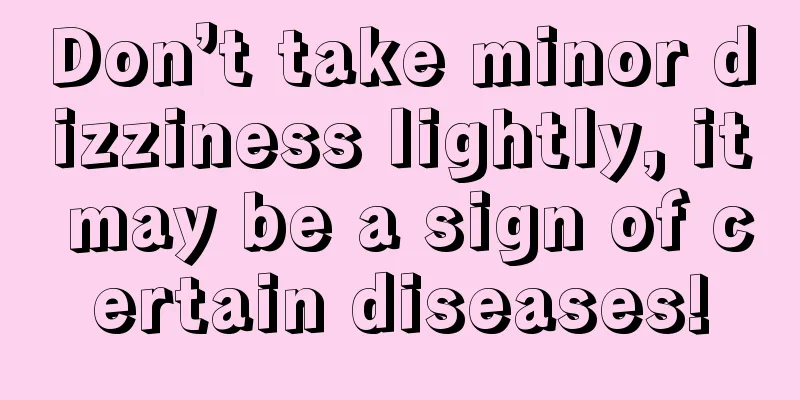Don’t take minor dizziness lightly, it may be a sign of certain diseases!

|
Dizziness is a very common symptom in life, especially when you squat for a long time or sit and suddenly stand up. Severe vertigo can cause loss of consciousness and fall to the ground. Some people may also experience nausea, vomiting, palpitations, and sweating. This must be taken seriously! 1. Presyncope syndrome It is similar to the feeling of dizziness, blurred vision, weak limbs and unsteady standing when you suddenly stand up after squatting on the ground for a long time. In severe cases, the patient may experience blacking out, loss of consciousness, falling to the ground, and a pale face. Some patients experience nausea, upper abdominal discomfort, palpitations, sweating, etc. during an attack. During a presyncope attack, lying flat on your back can quickly improve symptoms. In most cases, presyncope syndrome is related to physical constitution, that is, it is more common in tall and thin young women and those who lack exercise. However, acute massive bleeding, heart disease, etc. can also cause syncope, and these dangerous conditions should be ruled out first. Generally, acute massive blood loss is ruled out first, especially gastrointestinal bleeding (gastric bleeding, etc.). Before vomiting blood or excreting black stools, there are often no other signs of bleeding, which can be easily overlooked. If there is no major bleeding, further investigation will be conducted with the neurology department to confirm that it is presyncope syndrome or postsyncope, and further examination will be conducted to rule out cardiac causes. If the cause is confirmed to be cardiac, cardiovascular medicine diagnosis and treatment is required. 2. Dizziness During an attack, the patient feels dizzy and unwilling to open his eyes. This attack is often accompanied by nausea, vomiting, palpitations, and sweating. Bed rest does not provide complete relief. It may be accompanied by tinnitus, hearing loss, and a feeling of blockage. The most common cause is otolithiasis, a benign form of vertigo that poses no significant danger. It usually occurs after getting up, lying in bed, turning over, or pitching forward, and disappears within a few seconds to tens of seconds. It recurs frequently and usually resolves automatically within four weeks. The diagnosis can usually be confirmed through special tests performed by an otolaryngologist. However, for middle-aged and elderly people, especially those with hypertension, diabetes, coronary heart disease, cerebral infarction and other diseases, sudden dizziness may be a manifestation of stroke and requires emergency medical treatment. 3. Imbalance It is a feeling of being unstable when standing or walking, quite similar to the feeling of a person who is afraid of heights standing on a tall building or cliff and looking down. If a normally healthy person suddenly experiences a feeling of imbalance, he or she needs to be aware of the possibility of a stroke and must seek emergency medical attention. However, the elderly, especially those with hearing or vision impairment, or those with brain, spinal cord, or nerve diseases, will have a long-term sense of mild to moderate instability. The greatest danger is falling and causing fractures, so it is best to use a cane for safety. Some anxious patients also experience a sense of imbalance, especially in open halls or squares, which is called "agoraphobia." You can see a psychiatrist. 4. General dizziness Symptoms include dizziness, heaviness, swelling of the head, mild headache, tightness of the head, etc., and a feeling of discomfort in the head, usually accompanied by restlessness, irritability, drowsiness, insomnia, memory loss, inattention, decreased work efficiency, etc. It is common in high blood pressure, anemia, colds, fever, hangover, insomnia, sleep apnea, anxiety and depression, cervical spondylosis, etc. Generally, there is no major danger. While it is important to treat the primary disease, it is also very important to correctly understand the disease, eliminate worries, and relax. |
<<: Do you know the five main culprits of back pain?
>>: What causes back pain during menstruation? How to relieve back pain during menstruation?
Recommend
“Acne” is actually related to “eating too much salt”, who knows?
People often ask: Why do I always get acne? Why d...
The iron content is 15 times that of fresh grapes! Eat this way and double the nutrition
Now is the season for eating grapes, but do you l...
Symptoms of increased estrogen secretion after pregnancy
Many pregnant women are particularly concerned ab...
These foods can relieve spring fatigue and benefit the body and mind. Most people don’t know about the last one!
Spring and summer are the key periods for regulat...
Which should be added first when cooking, salt or sugar? What is the role of adding salt or sugar when cooking?
We all know that cooking is very particular, espe...
Why do girls have blood clots when they have their period?
Menstruation is something that every female frien...
Can pregnant women with allergies apply ointment?
Everyone knows that skin allergies generally need...
Why do I always fart but not defecate after giving birth?
After giving birth, you often fart a lot and don’...
What should I do if my uterus is a little sagging?
After giving birth, the uterus will be affected b...
Pregnancy belly suddenly hard
We all know that women will show various symptoms...
What are the signs before labor? Teach you how to distinguish false labor
After ten months of pregnancy, many pregnant moth...
What is the name and history of the Ginkgo tree? What does the Ginkgo tree look like?
Ginkgo is a tall tree, a rare species of Mesozoic...
Who is the supreme leader of Tibetan Buddhism now? What are the specialties of Tibet?
The English word "Tibet" may have origi...
What is the meaning of Weibo Solo Night? How to pass the Solo Night in 2020
Today is the last day of 2019, and the last day o...









